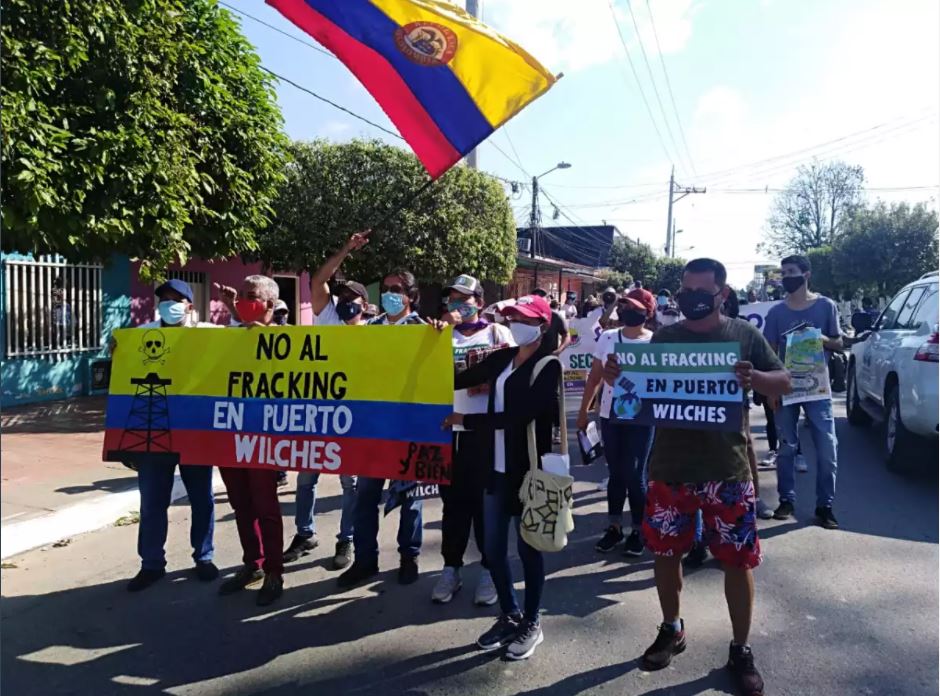RIO DE JANEIRO, BRAZIL – Colombia’s National Environmental Licensing Authority (ANLA) approved, amid criticism from political opposition and civil society, the first fracking pilot project in Puerto Wilches, in the department of Santander, environmental organizations reported Monday.
Although Resolution 00648 of 2022 has not yet been made public, a leak revealed the details of the Kalé initiative, whose development will be in the hands of the state oil company Ecopetrol.
At a time of oil and gas production uncertainty caused by the Russian military operation in Ukraine, the authorized area will have up to 4.67 hectares, and the fracturing activity will be at a depth of 1.2 kilometers.

For its part, Ecopetrol has previously defended that the project seeks to “evaluate the potential environmental impacts derived from the execution” and that it has contemplated “measures to prevent, mitigate, correct and compensate possible impacts on ecosystems, biodiversity, water resources, soil, and air, among other aspects”.
REJECTION OF ECOPETROL’S FRACKING PILOT
The Colombia Free of Fracking Alliance denounced in a communiqué that “amid irregularities, protests, and threats, the ANLA approves environmental license for Ecopetrol’s fracking pilot” in an “unprecedented” environmental bidding process.
The process has been developed “in less than five months, with numerous voices of rejection, serious questioning of the process, and the increase in acts of violence in Magdalena Medio, including death threats that involved the exile of an activist from the region”, detailed the alliance’s communiqué.
“Regrettably, a fundamental issue in energy matters has not been debated in the Congress of the Republic, where the allies of the government delayed for the third consecutive time the discussion of the bills to ban fracking, and it is decided by the Government (of Iván) Duque, on the spur of the moment, without guarantees and a few months before the inauguration of a new president,” they added.
At the same time, they criticized “the false discourse of Duque who sells himself abroad as a defender of the environment while accelerating fracking projects in Colombia that would generate emissions that would far exceed the country’s ‘ambitious’ climate commitments”.
The news was also rejected by the leftist presidential candidate Gustavo Petro, who indicated in his social networks that “fracking is the most predatory mechanism because it kills the territory’s water to continue an economic system based on hydrocarbons”.
“Puerto Wilches has a much better future in the agribusiness of small and medium agricultural producers,” he said on his Twitter account.
WHAT DOES THE PROJECT INCLUDE?
This project, along with other pilot projects, received the approval of the Council of State in 2019 with the intention that they become a kind of “test” of the consequences that fracking could have in Colombia.
This plan contemplates that the risk to environmental and water resources and the impact this technique would have on communities will be studied.
However, the Kalé project has been approved “without the broad and informed participation of the communities of Puerto Wilches and Magdalena Medio, where for more than 100 years, they have suffered the consequences of environmental and social degradation associated with the exploitation of hydrocarbons conventionally,” according to the organizations.
Duque has kept his promise that while he governs, there will be no fracking in Colombia, which technically may be fulfilled because he will leave power before the project begins to operate. However, the decision has been approved under his mandate.
The hydraulic fracturing technique has many detractors who warn about its environmental, hydraulic, and social implications.
On the contrary, its advocates claim it is a solution to meet the growing demand for energy with cleaner resources than coal.
Fracking makes it possible to extract shale gas, a type of hydrocarbon found in layers of rock at great depths, for which the earth must be drilled, and then large quantities of water mixed with chemicals must be injected at high pressure to fracture the rock and release the gas.

